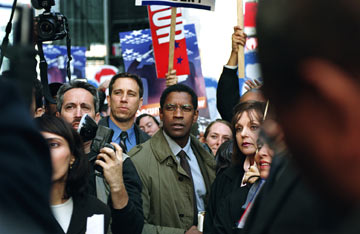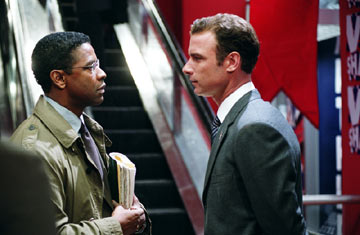

In the original 1962 The Manchurian Candidate, returning veterans from the Korean War found themselves the victims of brainwashing that gave them false memories. It was a chilling movie that left a huge impact on everybody that watched it, especially given the political climate at the time. Director Jonathan Demme capably adapts Richard Condon's novel to today's post 9/11 political climate. Demme (The Agronomist, The Truth About Charlie) modernized it to take into account the more advanced technology of today, and filled his cast with some spectacular actors. The result is a highly relevant film with great actors, although it does seem to stretch a tad long in places. It all begins with the dreams of Capt. Ben Marco (Denzel Washington, Man on Fire, Out of Time), a Gulf War veteran who survived an ambush thanks to the heroics of Sgt. Raymond Shaw (Liev Schreiber, The Sum of All Fears, Kate & Leopold), who managed to single-handedly fend off the attackers and lead a platoon of soldiers to safety.
After his return, Shaw received the Medal of Honor, and is now a rising political star. Marco's dreams are disturbing, because in his dreams he remembers things happening differently. Strange images that don't make any sense constantly appear. Worse, when one of his men (Jeffrey Wright, Ali, Shaft) comes to him with the same dreams, it really perturbs Marco. Marco wants to talk to Shaw, who alternates between genuine interest and disdain for his old superior. Tied up in all of this is Manchurian Global (yeah, the "Manchurian" portion doesn't really make sense anymore), a giant corporation bent on controlling the government. It's no real secret to say that Manchurian Global is behind Marco's dreams. They altered the memories of his entire platoon, and have the ability to control them. With the help of Sen. Eleanor Shaw (Meryl Streep, The Hours, Adaptation), Raymond's mother, and an influential Senator, they want to place Shaw as the Vice Presidential candidate so they can essentially run the government.
The plot is similar to many of the grand conspiracy movies that seem to abound today. There are huge rumblings in the government, and only one or two people realize this and they are the only ones that can solve it. Most of Daniel Pyne (The Sum of All Fears, Any Given Sunday) and Dean Georgaris' (Paycheck, Tomb Raider: The Cradle of Life) deals with Marco. Is he truly onto something or is he actually crazy? When he brings up his concerns to Sen. Thomas Jordan (Jon Voight, Holes, Ali), Jordan chastises him for stringing together disparate ideas into a fantastic conspiracy theory. Deep down, the viewer knows that Marco is right, but there's always a nagging suspicion that he actually may be suffering from something like Gulf War Syndrome. Washington, usually a commanding presence on screen, tones down his performance and is much more timid. Marco is a man unsure of himself. He needs to figure out if what he suspects is correct. Recently, Washington seems to be trying very hard to broaden his range in roles, and this is another welcome departure from his standard hero.
Demme should be commended for weaving politics successfully into the story. This is a very hard thing for any director to do without looking stupid, but it meshes very well with the story. The politicians in the movie jockey for votes in a divided America with the constant shadow of terrorism looming over the populace. Corporate lobbyists vie for attention and votes within the government, and it almost makes sense that a company would want to control the White House. Streep's performance as Shaw is strong. She is determined to get what she wants, and nothing, not even a little thing like ethics, can stop her. Schreiber has always been something of a chameleon. He shifts from role to role, always looking for something different. This is good for Shaw, who waffles between what he wants to do and the expectations of his mother. It's all internalized, although one can see the struggle within. No one can tell if he's in on the plan, or if he's an unwilling pawn. The Manchurian Candidate moves forward in fits and spurts, sometimes pacing quickly, then sometimes going a little too slowly. But nobody can say that it's not interesting.